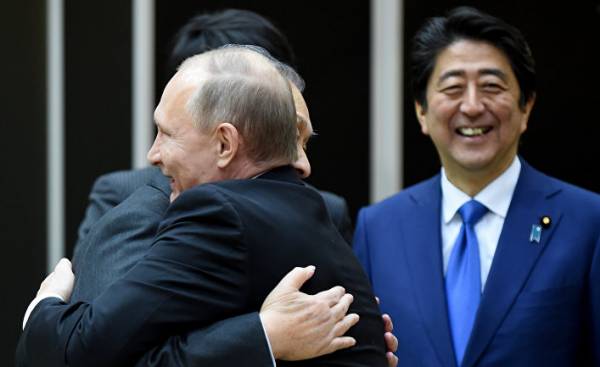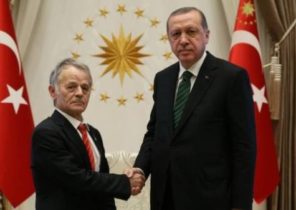
Last year, Prime Minister Shinzo Abe follows the “new approach” to relations with Russia. Announced officially in may 2016, this policy involves regular private meetings between the leaders and the establishment of closer ties between the two countries, especially in the economic sphere. In the West, this “new approach” is considered controversial due to imposed against Russia sanctions and accused the Japanese that they undermine attempts to isolate Russia. Indeed, such behavior of Japan may seem surprising, because this country has traditionally been very closely followed the foreign policy of the United States as the chief guarantor of its security.
The main reason for the Japanese self-will is a strong desire to resolve the Kuril issue in a period when low oil prices and Western sanctions make Moscow more amenable. But this reason is not the only one: Japan wants to develop closer ties with Russia to ensure their security.
During the cold war, Japan considered the Soviet Union a serious threat to national security. One of the main military priorities of the era for the Japanese was the protection of Hokkaido (Northern island of the Japanese archipelago) from the Soviet invasion. But now, despite the crisis in relations between Russia and the West, Japan does not consider Russia a potential enemy and redeployed many military power from Hokkaido in the South-Western part of the country. Moreover, the Japanese national security strategy 2013 is Russia not as a threat but as an important partner in maintaining peace and stability in East Asia.
Is Russia the main threats in the eyes of the Japanese leadership were China and North Korea. Japan’s primary defense against Chinese activity in the East China and South China seas and from the nuclear programs of North Korea is a military Alliance with the United States. But Tokyo’s growing understanding that Russia too can play a useful role in addressing these problems in the field of security.
As regards North Korea, Japan hopes that Russia can use its remaining influence to deter aggressive behavior out of Pyongyang. In China, the purpose of Japan is to counter the increasing rapprochement between Moscow and Beijing. Tokyo considers this Alliance as a threat, because, as explained, Tomohiko Taniguchi, senior Advisor to Prime Minister Abe, “this is the first time in the modern history of Japan, when it is located between the Northern and southern bear and the dragon where both countries are strong at the same time.” In particular, Tokyo is afraid that Russia will support China’s actions in disputed with Japan in the Senkaku and Chinese attempts to dominate the South China sea, through which passes most of the trade of Japan, including imports of oil and gas from the Middle East.
The goal is to separate Russia from China could be to Tokyo all the more important when, under the leadership trump America will take a course on isolation and could care less about the safety of Japan. For example, it will be interesting to know, whether will repeat trump’s promise to Obama to defend the Senkaku Islands, although officially the US does not recognize Japan’s sovereignty over them?
For these reasons, Japan has moved to a new approach to Russia in 2016. Japanese leaders feared that due to Western sanctions and the crisis in relations with USA, Russia will be forced to move even closer to China. Why Japanese analysts have decided they need to take action quickly to prevent the development of katielance between Russia and China.
For the same reasons in the near future we can expect the continuation of Russian-Japanese cooperation in the field of security. For example, it is possible that the negotiations in the format “two plus two” among the foreign Ministers and defense Ministers of Japan and Russia will be renewed in 2017. The talks last took place in late 2013, but during Putin’s visit to Japan in December 2016, Russian foreign Minister Sergei Lavrov said that the sides agreed to hold another meeting in the near future. There are many themes that Russia and Japan can productively discuss. For example, the nuclear threat of North Korea and the situation in Syria. It is also possible that Japan will start to pay more attention to the Ukrainian crisis.
In addition to restarting the format of “two plus two”, the two countries can expand cooperation in other areas such as counter-piracy, counternarcotics and search-and-rescue operations. The parties can return to discussion of the agreement on prevention of dangerous military activities. These negotiations were suspended in March 2014 due to Ukrainian crisis, but can be resumed in the near future.
Most likely, the relationship between Japan and Russia in the field of security will be in 2017 closer. It would be beneficial for both countries. But this cooperation has clear boundaries. First, although Japan wants to expand relations in the security area with other countries in the region, including Russia, but its main ally will still be USA. Japan still depends on American troops in matter of national security. And if between cooperation with Russia and the USA will be a serious contradiction, Japan will always choose America.
Similarly for Russia, relations with China more important than Japan. This is directly confirmed by the President Putin in an interview he gave to Japanese journalists ahead of his visit to Japan in December. Reporters asked him: “China is really the main partner of Russia? We correctly understand?” The Russian President replied: “Absolutely.” That is, Russia will not cooperate with Japan in security matters, where it could harm its relations with China. For example, the Japanese side would like to discuss the topic of China in the format “two plus two”, but Russia did not agree.
Also the cooperation between the two countries will not interfere with the question of American missile defense. From the point of view of Russia attempts by the US to deploy elements of its missile defense system in East Asia is a threat for Russia and for the entire region. However, Japan believes that this system is very useful for its national security, especially to protect the country from missiles of North Korea. Japanese defence Minister Inada expressed interest in buying the U.S. missile defense system THAAD. This is the same system that already decided to purchase South Korea, which caused tensions with China.
Security issues have become an important area for potential cooperation between Russia and Japan, in addition to the economic sphere and negotiations on concluding a peace Treaty. Most likely, this kind of cooperation will develop gradually, because Japan is still afraid of China and wants to strengthen ties with other partners in the region. However, the geopolitical position of Russia and Japan remain largely incompatible, and a clear boundary for such cooperation are clearly visible now.







